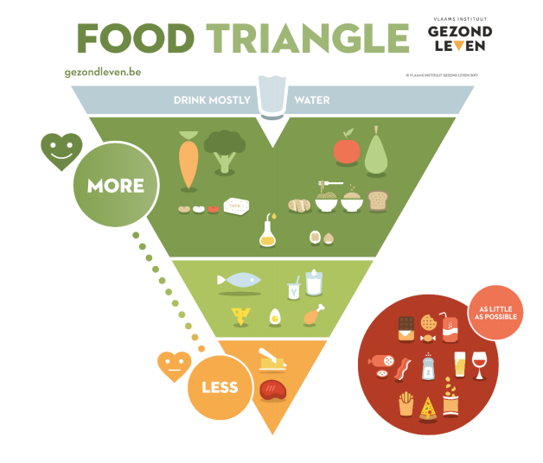People often still see a healthy body and a healthy mind as two separate entities. To be physically healthy, you need to get enough exercise, eat healthy food, relax regularly and get a good night's sleep. To be mentally healthy, you can work on your way of thinking and your resilience. This is all true of course. But your body and mind definitely also influence one another. Working on your physical health will make sure you also see changes in your mental well-being, for instance in your
determination, your optimism and your self-confidence. If you work on your mental health by developing more resilience, you'll see that you are able to and want to extend your physical boundaries further. In this newsletter we'll be focusing on what you can do to improve your physical health, allowing you get into that upward spiral and also feel a lot healthier mentally.
Exercise
Exercise helps you to relax and restores your energy. Exercising and practicing sports help to reduce the stress hormones in your blood, making you feel better straight away. Not only that, regular exercise or sports help you to sleep better and therefore make sure you wake up feeling rested. And when your condition improves, you'll notice you don't lose energy as quickly and you are more resilient throughout the entire day.
Tips for healthy exercise
Getting started with healthy exercise isn't always easy. It is important to remember that the best way is to build up your exercise or sports activity slowly and that you give
yourself time to - both mentally and physically - get used to the change. And never forget the importance of relaxing either, because your muscles also need rest in order to recover from physical exertion. Finally, try to find an activity you really like doing. This will boost your motivation and make it easier to keep it up!
How much exercise is healthy?
If you want to lead a healthy life, a good start is to limit sitting down and to be active. It's best to alternate between sitting, standing and exercising.
Relaxation
Alternating exercise with relaxation is vital and revitalising. The exercise we're talking about can either be physical or mental. Relaxing not only makes you feel good at that moment, it also makes sure your feel fitter and more refreshed afterwards. There are several ways you can relax and, like with sports, it's important to find something that helps you to relax. For some it might be reading a good book, for others it's a nice hot bath. Others still might choose a more active form of relaxation, such as taking the dog for a walk or doing yoga.
Mindfulness
Mindfulness is a technique to learn how to be more in the here and now and to experience life as it presents itself to you. Because you're not constantly worrying about the past and how to deal with the future, you'll notice that mindfulness helps you feel more relaxed. You actually learn to accept things the way they are, so they bother a lot less.
Food and diet
For many people, diet is only something to look at if you want to lose weight. Yet a healthy diet isn't just important to look good; the right diet makes you feel healthier inside, helps you sleep better and gives you more energy. Fast-acting sugars (or carbs), for instance, cause your sugar level to peak, only to drop dramatically afterwards. You'll notice that if you have white bread or pasta for lunch, you'll feel an energy dip at some point during the afternoon.
Healthy diet
At the end of last year, on the 20th anniversary of the Active Food Triangle, the Flemish Institute for Healthy Living (VIGeZ) introduced the new version of their food model. This new, more simplified triangle is based on thorough research and helps us to make healthy and sustainable choices.

Sleep
Getting enough and proper sleep is also important for our recovery. Lack of sleep influences the functioning of our brain. It affects our memory, our ability to concentrate, our speaking faculties, our reaction speed and decisiveness, and our ability to plan and prioritise. In addition, it has an impact on our emotions and physical health. The amount of sleep a person needs can differ enormously from one person to the next. On average it's 7 to 9 hours a night, but some people can do with less, while others need more.
Vicious circle
Insufficient sleep can lead to you getting stuck in a vicious circle. You don't sleep well, so you start to worry about your sleeping pattern. The stress and fear this awakens make you feel physically more tense. What's more, people often resort to the wrong solutions, like drinking more caffeine during the day or taking sleep medication (causing you to sleep less deeply). All this adds up and deprives them of even more sleep. It's therefore important to get into good habits before bedtime.
Employee Assistance Programme (EAP)
Feel free to ask us your questions. Go to the helpdesk page and discover how you can contact us.
